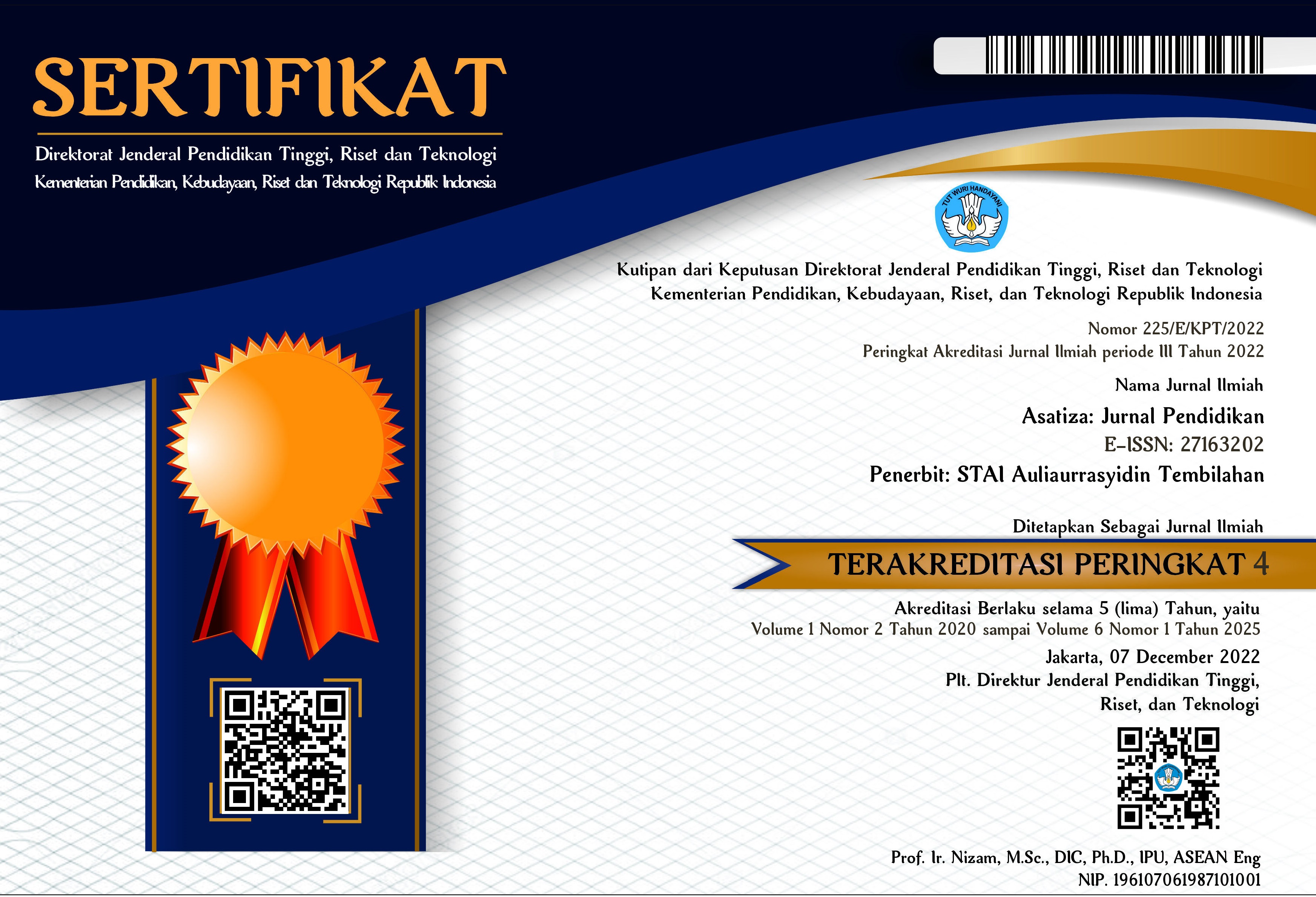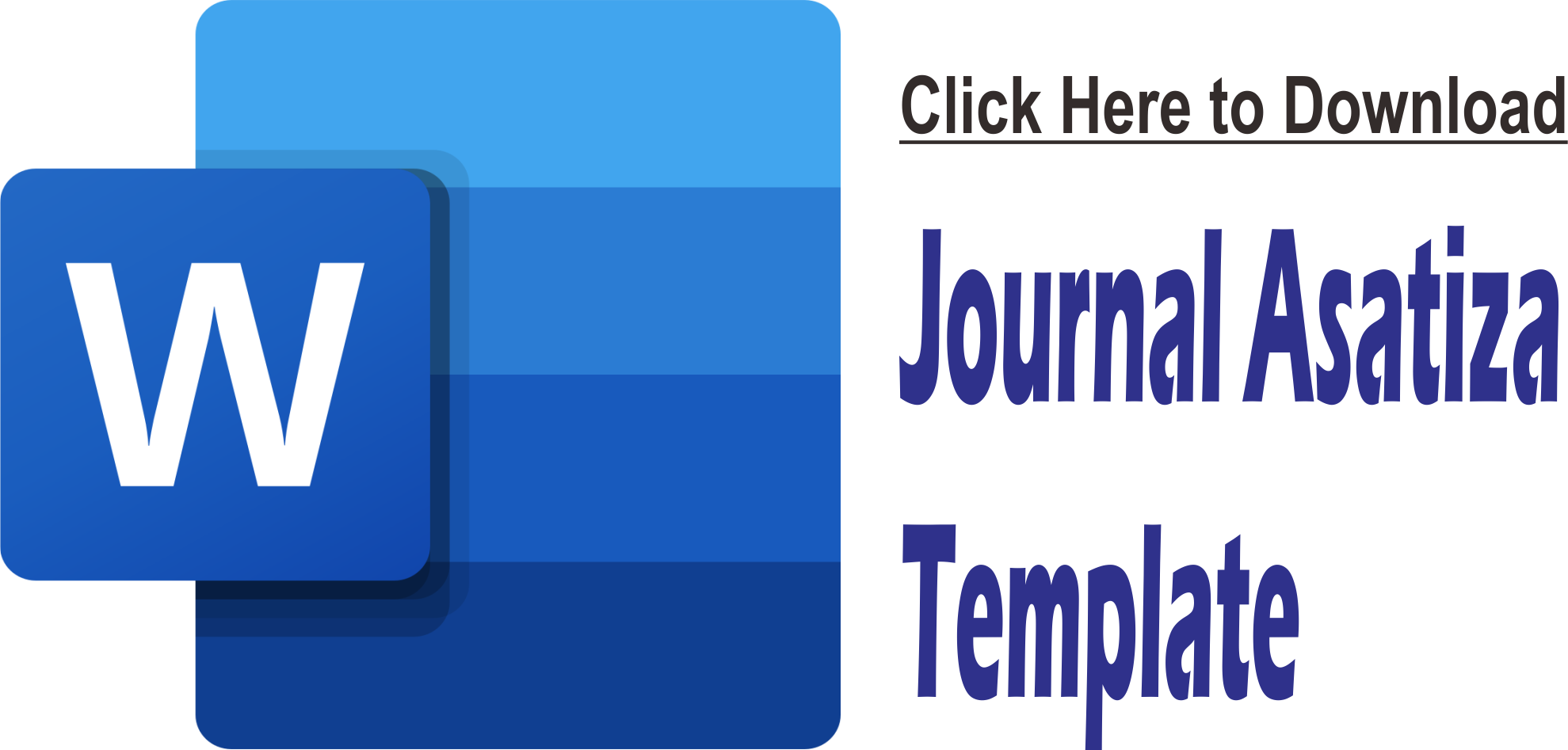Nilai-Nilai Pendidikan dalam Al-Qur’an Surah Ali ‘Imran Ayat 159 dan Al-Qur’an Surah At-Taubah Ayat 128-129: Kajian Perspektif Tafsir Ibnu Katsir
DOI:
https://doi.org/10.46963/asatiza.v4i2.785Keywords:
Education, Ibn Kathir, Values, InterpretationAbstract
This study aims to determine the educational values in the Qur'an surah Ali 'Imran verse 159 and Qur'an surah At-Taubah verses 128-129: A study of the perspective of Ibnu Katsir's interpretation. This research includes library research (library research). Primary data sources and secondary data sources are two categories into which researchers divide data sources. As the main source, used in the Qur'an surah Ali 'Imran verse 159 and in the Qur'an surah At-Taubah verses 128-129perspective of Ibn Kathir's commentary. Meanwhile, secondary data sources include books related to research and scientific journals. Based on the research results obtained that education contained in the Qur'an surah Ali 'Imran verse 159 and Qur'an surah At-Taubah verses 128-129, namely being gentle; sincere in forgiving others; respect the opinions of others; put your trust in Allah; have sympathy and empathy for others; be compassionate to others; always do good and put others first; make God a place to lean on.
Downloads
References
’Abdullah bin Muhammad bin ’Abdurrahman bin Ishaq Alu Syaikh Terjemahan M. Abdul Ghaffar. (2005). Tafsir Ibnu Katsir Jilid 2. (M. yusuf Harun, Ed.) (5th ed.). Bogor: Pustaka Imam Asy-Syafi’i.
Abdalla, U. A. (2019). Menjadi Manusia Rohani. Bekasi: Alifbook.
Aisyah, S. E. (2020). Konsep Pendidikan Keimanan Kepada Rasul Dalam Kitab Jauharah Al-Tauhid Menurut Syekh Ibrahim Al-Laqqani. UIN Syarif Hidayatullah Jakarta. https://repository.uinjkt.ac.id/dspace/handle/123456789/54116
Amdani, Y., & Krisna, L. A. (2019). Konsep meminta maaf sebagai hukuman dalam perkara pidana. Jurnal Hukum Ius Quia Iustum, 26(1), 67–90. http://dx.doi.org/10.20885/iustum.vol26.iss1.art4
Asmuni. (2020). Karakteristik Ashabul A`raf Perspektif Tafsir Ibnu Katsir. El-Umdah, 3(2), 150–165. https://doi.org/10.20414/elumdah.v3i2.2413
Ghaffar, ’Abdullah bin Muhammad bin ’Abdurrahman bin Ishaq Alu Syaikh Terjemahan M. Abdul. (2005). Tafsir Ibnu Katsir Jilid 4. (M. yusuf Harun, Ed.) (5th ed.). Bogor: Pustaka Imam Asy-Syafi’i.
Kesuma, U. (2020). Implementasi tujuan pendidikan dalam meningkatkan hasil belajar siswa di MTs Patra Mandiri Plaju Kota Palembang. Al-Tarbawi Al-Haditsah: Jurnal Pendidikan Islam, 5(2), 146–180. https://doi.org/10.24235/tarbawi.v5i2.6387
Lubis, A. H. (2016). Pendidikan keimanan dan pembentukan kepribadian muslim. Jurnal Darul ‘Ilmi, 4(1), 65–73. https://doi.org/10.24952/di.v4i1.426
Maliki. (2018). Tafsir Ibn Katsir: Metode dan bentuk penafsirannya. El-Umdah, 1(1), 74–86. https://doi.org/10.20414/el-umdah.v1i1.410
Mira Fauziah. (2020). Sifat-sifat Da’i dalam Al-Qur’an. Jurnal Ilmiah Al-Mu’ashirah, 17(1), 126–136. http://dx.doi.org/10.22373/jim.v17i1.7910
Muawanah. (2018). Pentingnya pendidikan untuk tanamkan sikap toleran di masyarakat. Jurnal Vijjacariya, 5(1), 57–70. http://dx.doi.org/10.31219/osf.io/vqgj4
Nurhartanto, A. (2015). Nilai-nilai Pendidikan Akhlak dalam Al-Qur’an Surah Ali ’Imran Ayat 159-160. Profetika: Jurnal Studi Islam, 16(2), 159–160. https://doi.org/10.23917/profetika.v16i2.1851
Nurkholis. (2013). Pendidikan dalam Upaya Memajukan teknologi. Jurnal Kependidikan, 1(1), 24–44. https://doi.org/10.24090/jk.v1i1.530
Rahman, A. (2011). Memahami esensi asmaul husna dalam Alqur’an. Jurnal Adabiyah, 11(2), 150–165. http://journal.uin-alauddin.ac.id/index.php/adabiyah/article/view/1723/pdf
Rahman, A., Munandar, S. A., Fitriani, A., Karlina, Y., & Yumriani. (2022). Pengertian pendidikan, ilmu pendidikan dan unsur-unsur pendidikan. Al Urwatul Wutsqa: Kajian Pendidikan Islam, 2(1), 1–8. https://journal.unismuh.ac.id/index.php/alurwatul/article/view/7757/4690
Sari, M., & Asmendri. (2020). Penelitian Kepustakaan (Library Research) dalam Penelitian Pendidikan IPA. Natural Science: Jurnal Penelitian Bidang IPA dan Pendidikan IPA, 6(1), 41–53. https://doi.org/10.15548/nsc.v6i1.1555
Soleh Al-Munajjid, M. (2011). Fenomena Lemahnya Iman. Jakarta: Darul Falah.
Subhi, D. (2020). Keimanan : Iman dalam Perspektif Islam. OSF Praprint. https://doi.org/10.31219/osf.io/ukbs4
Syarifah Habibah. (2015). Akhlak dan etika dalam Islam. Jurnal Pesona Dasar, Vol.1(4), 81. http://e-repository.unsyiah.ac.id/PEAR/article/view/7527/6195
Yahya, B. (2020). QS At-Taubah 128-129: Alasan Terpilihnya Nabi | Tafsir Al-Qur’an. Indonesia: www.youtube.com. Available from https://www.youtube.com/watch?v=j0oa2k1sB4A
Zainuddin, A. A. bin M. A. dan. (2019). Penafsiran Ibnu Katsir terhadap Ayat-Ayat Isra’ Mikraj Ahmad. Tafse: Journal of Qur’anic Studies, 4(1), 19–35. http://dx.doi.org/10.22373/tafse.v4i1.13099
Zulfian, Z., & Saputra, H. (2021). Mengenal Konsep Tawakal Ibnu ‘Athaillah Al-Sakandari. Jurnal Pemikiran Islam, 1(1), 74–88. http://dx.doi.org/10.22373/jpi.v1i1.10357
Downloads
Published
Issue
Section
License
Copyright (c) 2023 A. M. Irfan Zidni, Didin Rojudin

This work is licensed under a Creative Commons Attribution-ShareAlike 4.0 International License.
Authors who publish with this journal agree to the following terms:
1. Copyright on any article is retained by the author(s).
2. The author grants the journal, right of first publication with the work simultaneously licensed under a Creative Commons Attribution shareAlike 4.0 International License that allows others to share the work with an acknowledgment of the work’s authorship and initial publication in this journal.
3. Authors are able to enter into separate, additional contractual arrangements for the non-exclusive distribution of the journal’s published version of the work (e.g., post it to an institutional repository or publish it in a book), with an acknowledgment of its initial publication in this journal.
4. Authors are permitted and encouraged to post their work online (e.g., in institutional repositories or on their website) prior to and during the submission process, as it can lead to productive exchanges, as well as earlier and greater citation of published work.
5. The article and any associated published material is distributed under the Creative Commons Attribution-ShareAlike 4.0 International License











2.png)



